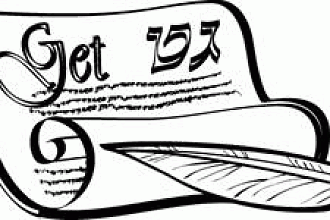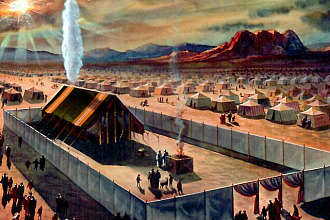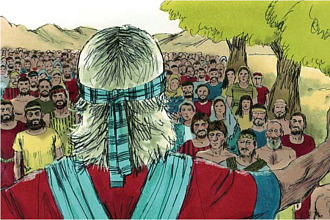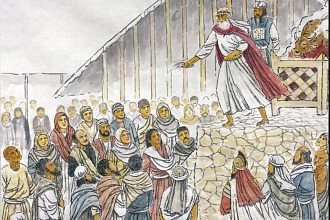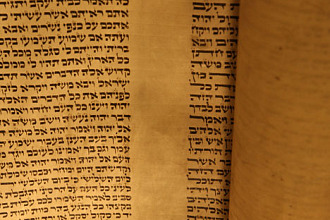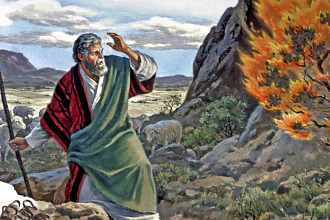Parasha for the Week: Shemot: Exodus 1:1 - 50:26.
Haftarah for the Week: Isaiah 27:6 - 29:23 (Ashkenazim).
Haftarah for the Week: Jeremiah 1:1 - 2:3 (Sephardim).
Besorat Yeshua: Mark 14:10.
Overview
With the death of Yosef, the Book of Bereshit (Genesis) comes to an end. The Book of Shemot (Exodus) chronicles the creation of the nation of Israel from the descendants of Yaakov. At the beginning of this week's Parasha, Pharaoh, fearing the growth of Jews, enslaves them. When their birthrate increases, he orders the Jewish midwives to kill all newborn males. Yosheved gives birth to Moshe and hides him in the reeds by the Nile.
Pharaoh's daughter finds and adopts him, although she knows he is probably a Hebrew.
Miriam, Moshe's sister, offers to find a nursemaid for Moshe and arranges for his mother Yocheved to fulfill that role. Years later, Moshe witnesses an Egyptian beating a Hebrew, and Moshe kills the Egyptian. Realizing his life is in danger, Moshe flees to Midian where he rescues Tzipporah, whose father Yitro approves their subsequent marriage.
On Horev (Mt. Sinai) Moshe witnesses the burning bush where G-d commands him to lead the Jewish People from Egypt to Eretz Yisrael, the land promised to their ancestors.
Moshe protests that the Jewish People will doubt his being G-d's agent, so G-d enables Moshe to perform three miraculous transformations to validate himself in the people's eyes: transforming his staff into a snake; transforming his healthy hand into a leprous one; and transforming water into blood.
When Moshe declares that he is not a good public speaker, G-d tells him that his brother Aharon will be his spokesman.
Aharon greets Moshe on his return to Egypt, and they petition Pharaoh to release the Jews. Pharaoh responds with even harsher decrees, declaring that the Jews must produce the same quota of bricks as before but without being given supplies. The people become dispirited, but G-d assures Moshe that Pharaoh will let the Jews leave.
Kindness Saves Lives
Tziporah, Moshe's future wife, and her six sisters drew water for their father's sheep. Shepherds came and drove them away. The Torah tells us that then... "Moshe got up and saved them and watered their sheep."
Moshe saved Tziporah, who at that time was a total stranger. Later on we read in the Torah how Tzipporah saves Moshe's life while he is on his way back to Egypt from Midian to bring out the Jewish people (Exodus 4:24-5).
From here we learn that all the kindness that a person does for someone else is eventually repaid to them. Whenever you do a favor for someone, you benefit yourself.
Make a Child Feel Good
The Torah states, "And the King of Egypt spoke to the Hebrew midwives, one was Shifrah and the name of the second was Puah" (Exodus 1:15). A child who experiences warmth and love grows up to be a more loving person. This early conditioning will have life-long positive effects. Such a child will find it much easier to feel love for the Almighty and love for others. Whenever you make a young child feel good, be aware of the extent of your kindness. The deeper your appreciation for the chesed (kindness) you are doing, the more elevated you become!
HAFTARAH: Isaiah 27:6 – 29:23 - Ashkenazim
Parasha: Jacob (Israel, G-d's vineyard) is oppressed by a foreign power, even though Israel has been a blessing for that nation. Jacob blessed Joseph, and said, "The God before whom my ancestors Abraham and Isaac walked, the God who has been my shepherd all my life to this day, the angel who has redeemed me from all harm, bless the boys; and in them let my name be perpetuated, and the name of my ancestors Abraham and Isaac; and let them grow into a multitude on the earth" (Gen. 48:15-16). This experience will be repeated several times during the history of the people of Israel. After being a blessing for their hosts, these nations persecuted Israel.
Haftarah (Ashkenazi): The Accent here is put on the blessings upon Jacob (Israel, His Vineyard) who is removed from Egypt and will be fully blessed by the L-rd: "In days to come Jacob shall take root, Israel shall blossom and put forth shoots, and fill the whole world with fruit" (Is. 27:6).
Therefore thus says the LORD, who redeemed Abraham, concerning the house of Jacob: No longer shall Jacob be ashamed, no longer shall his face grow pale. For when he sees his children, the work of my hands, in his midst, they will sanctify my name; they will sanctify the Holy One of Jacob, and will stand in awe of the God of Israel (Is. 29:23).
HAFTARAH: Jeremiah 1:1 - 2:3 - Sephardim
Parasha: Moshe was called by G-d to be his prophet, but the first time he refused. But Moses said to the LORD, "O my Lord, I have never been eloquent” (Exodus 4:10).
Haftarah: (Sephardi) Jeremiah was called by G-d and like Moshe, tried to refuse: Now the word of the LORD came to me saying, "Before I formed you in the womb I knew you, and before you were born I consecrated you; I appointed you a prophet to the nations." Then I said, "Ah, Lord GOD! Truly I do not know how to speak, for I am only a boy" (Jer. 1:4-6 ).
Besorat Yeshua Mark 14:10 - 21
Parasha: Our text tells the story of the Exodus, which is the story told on Passover in every Jewish home. "Afterward Moses and Aaron went to Pharaoh and said, Thus says the LORD, the God of Israel, 'Let my people go, so that they may celebrate a festival to me in the wilderness'" (Exodus 5:1).
Besorah: This part of the story of Yeshua occurs at Passover time. This same Passover when Yeshua fulfilled the prophecy announced by the original Passover: "On the first day of Unleavened Bread, when the Passover lamb is sacrificed, his disciples said to him, 'Where do you want us to go and make the preparations for you to eat the Passover? '" (Mark 14:12)
Parasha: In this text G-d Sent Moses and Aaron to speak to Pharaoh to ask him to let his people go to celebrate a feast. "So come, I will send you to Pharaoh to bring my people, the Israelites, out of Egypt" (Exodus 3:10).
"Then the anger of the LORD was kindled against Moses and he said, "What of your brother Aaron, the Levite? I know that he can speak fluently; even now he is coming out to meet you, and when he sees you his heart will be glad. You shall speak to him and put the words in his mouth; and I will be with your mouth and with his mouth, and will teach you what you shall do" (Ex. 4:14, 15).
Besorah: This part of the story of Yeshua occurs during Yeshua's ultimate Passover. At this Passover Yeshua fulfilled all prophecies announced by the original Passover in Egypt at the time of Moses: So he sent two of his disciples, saying to them, "Go into the city" (Mark 14:13).
The parasha and the Besorah can be read in parallel to discover the story of Yeshua in the torah of Moshe Rabenu.
Yeshua said: "You search the scriptures because you think that in them you have eternal life; and it is they that testify on my behalf (John 5:39).







